Last updated: 25 June 2023
When I told a colleague we were going to spend a weekend in Northern Ireland over Easter I received a few eye rolls, and a ‘why do you want to go there?’
I was shocked to say the least! Tourism in Belfast has boomed in recent years, so much so that I thought we were a bit late to the party to be visiting! With world-class publications like National Geographic Traveller magazine hailing Belfast as a must see destination, or everyone’s favourite travel guide, Lonely Planet, awarding Belfast and the Causeway Coast as number one on their 2018 Best in Travel list. After spending a weekend in Belfast, it’s not hard to see why!
It’s taken two decades of transformation to revitalise a city that was once the heart and soul of the country’s shipbuilding industry. Even today, dotting the city skyline as you enter Belfast are the iconic canary yellow and black H&W cranes, Samson and Goliath, which belong to Harland & Wolff (H&W), builders of the ships for the White Star Line, including RMS Titanic.
The city’s troubled past has become a part of its history. Still raw for many of its inhabitants, Belfast has embraced the division of religion and culture, morphing into modern day Belfast, as she stands today.
Planning a weekend in Northern Ireland? Here’s some things to get you started:
Things to do in Belfast
Walking Tour
We love a good walking tour because it allows us to quickly get acquainted with a new city and figure out where all where everything is and highlight the places we want to return to during our stay. It’s also a great way to identify specific landmarks which makes navigation a little easier instead of having to constantly use maps on your phone. On this trip we opted to go with Free Belfast City Tour and our guide Ed was knowledgeable, entertaining and Belfast local who loved sharing the best places to visit when in town.
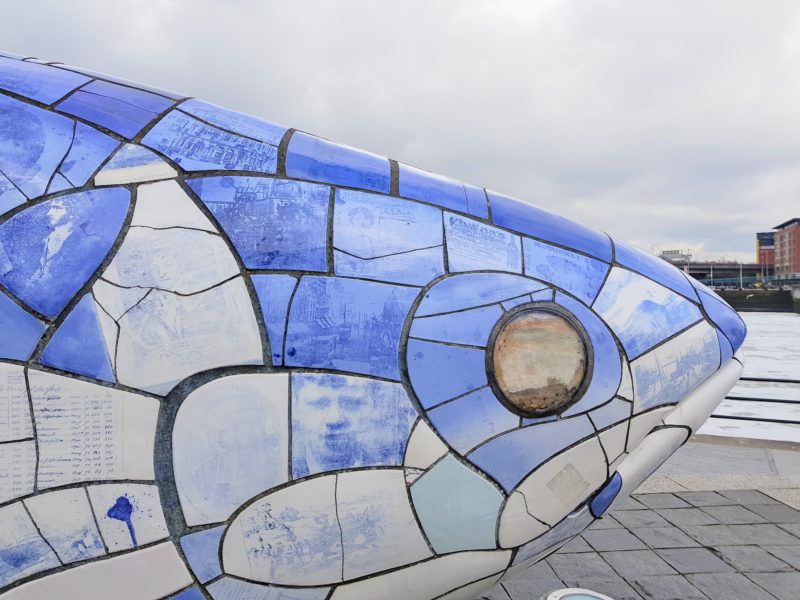
If you’ve ever done a free walking tour before then you know that the experience can be a little varied but the good thing is that you only need to pay what you feel the tour is worth and we’re happy to say that Free Belfast City Tour was a great way to get to know the city.
Conflict and Political tour
During our visit in 2018, it coincided with the 20th anniversary of the Good Friday Agreement. Signed 10 April 1998, the agreement is between the British and Irish governments and most of the political parties in Northern Ireland, outlining how Northern Ireland should be governed.
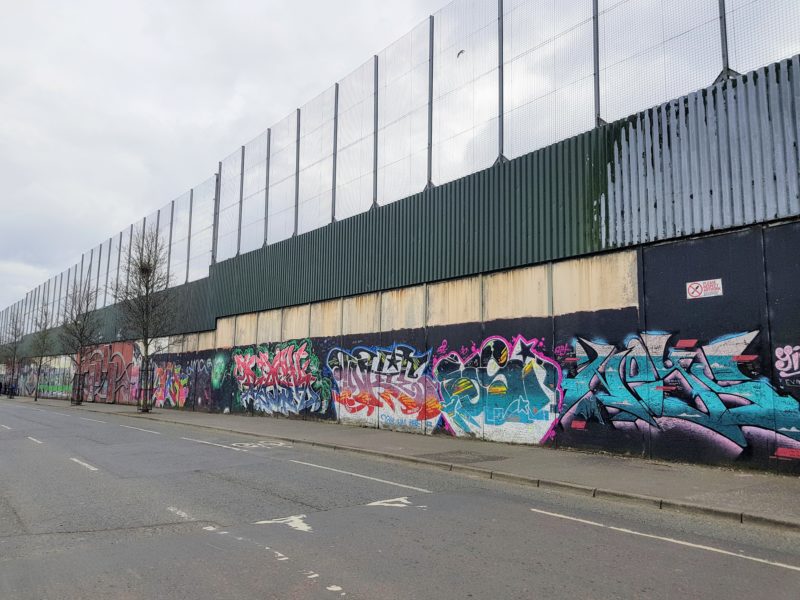
There’s no chance that you can visit Belfast without experiencing some type of reference to the most violent and turbulent chapter in Northern Ireland’s history – The Troubles. With an assortment of flags on display in various neighbourhoods, large and confronting murals, and memorial plaques scattered throughout Belfast, it is fair to say that there is a deep and complex history that can be explored during your stay.
Russ being the avid history buff that he is, wanted to learn as much about The Troubles as possible and what better way to explore both sides of the conflict than with insights from the people who lived through it.
We heard about a political history tour called the Conflict Tour in which you spend 90 mins with former political prisoners from each side of the conflict – Republican and Loyalist – whilst walking through some working class areas of Belfast, many of which were the front lines of this deadly conflict.

By the end of the three-hour tour our heads were spinning with what we had just experienced – learning about The Troubles from both perspectives was truly incredible, hearing about the experiences that these people had gone through, and comprehending the devastating loss of life and destruction caused throughout the decades.
If a three-hour walking tour will be a little too much for yo0 u then perhaps a good alternative is a Political Taxi Tour where a Belfast taxi driver will take you on a one-hour private guided tour of Belfast where you will be able to visit the Murals and hear accounts from both sides of the conflict.
Murals and Street Art
There are plenty of murals of the Falls and Shankill Roads relating to The Troubles, but there are also other non-political ones in Belfast’s unique street art scene.
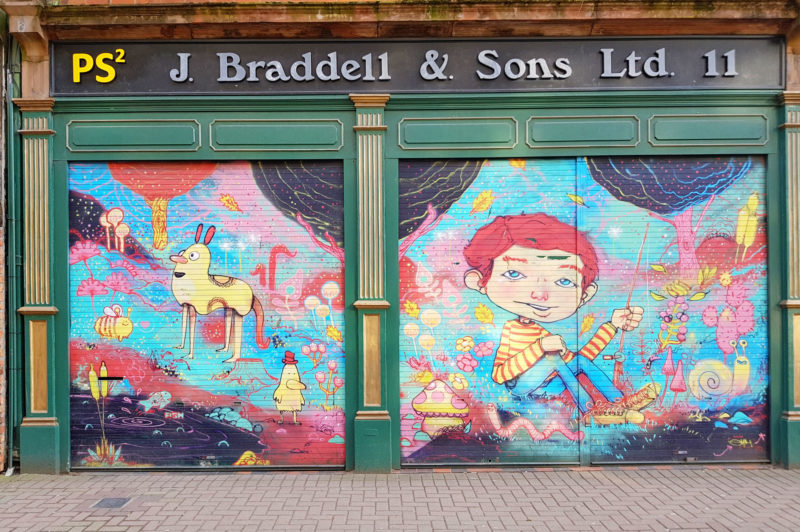
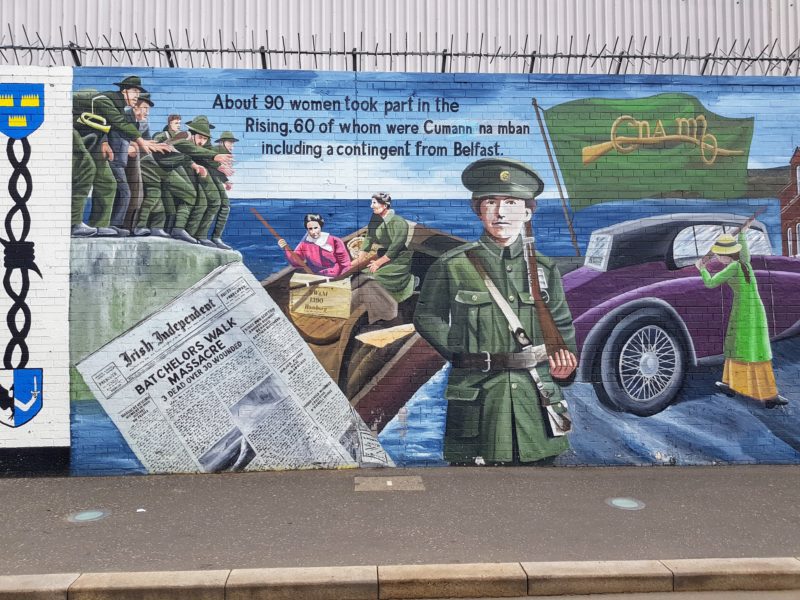
Find yourself on a dedicated walking tour to make the most of your time in Belfast, or simply do it yourself by walking the streets of the Cathedral Quarter to find them yourself.
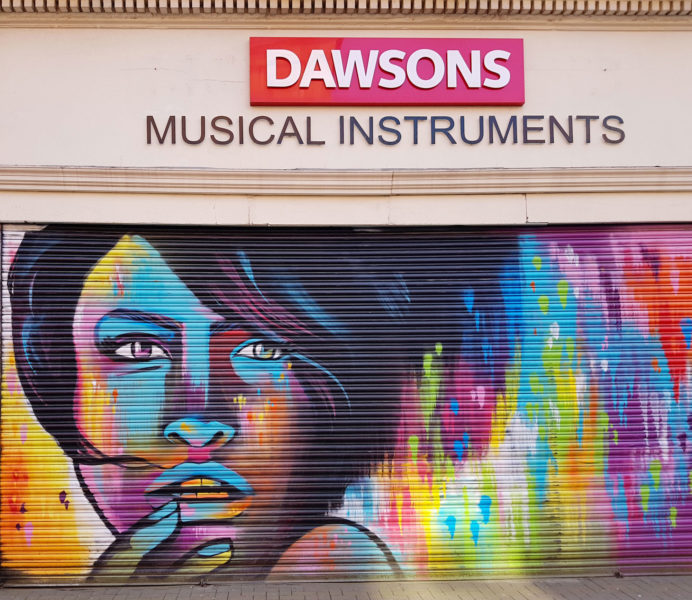
Belfast City Hall
Iconic and slap-bang in the middle of the town, this impressive civic space is worth a visit. There is a permanent exhibition detailing the history of Belfast, and daily tours are available. Do yourself a favour and note the tour & visiting times. We couldn’t go as it’s a government building, it was closed over Easter weekend.
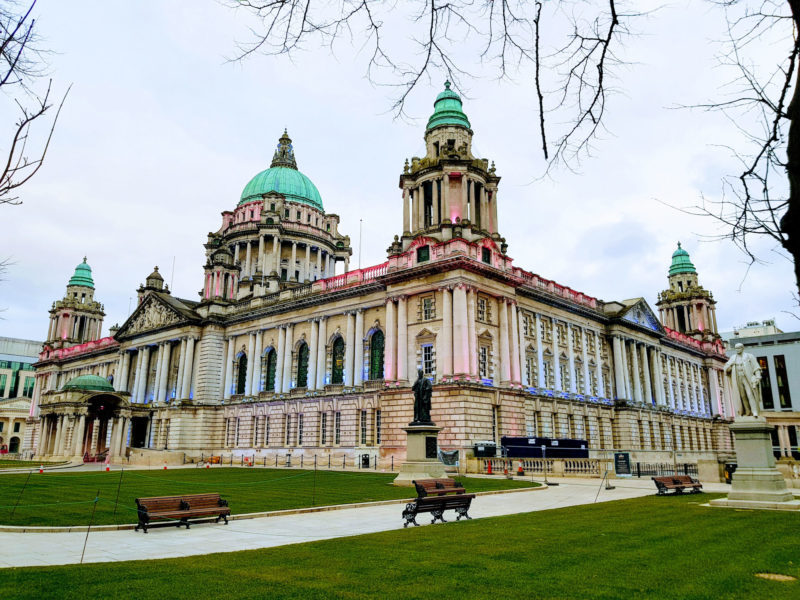
The gardens outside City Hall are home to a Titanic memorial which names all 1,512 victims of the disaster, including two stowaways, who to this day, their real-names remain a mystery.
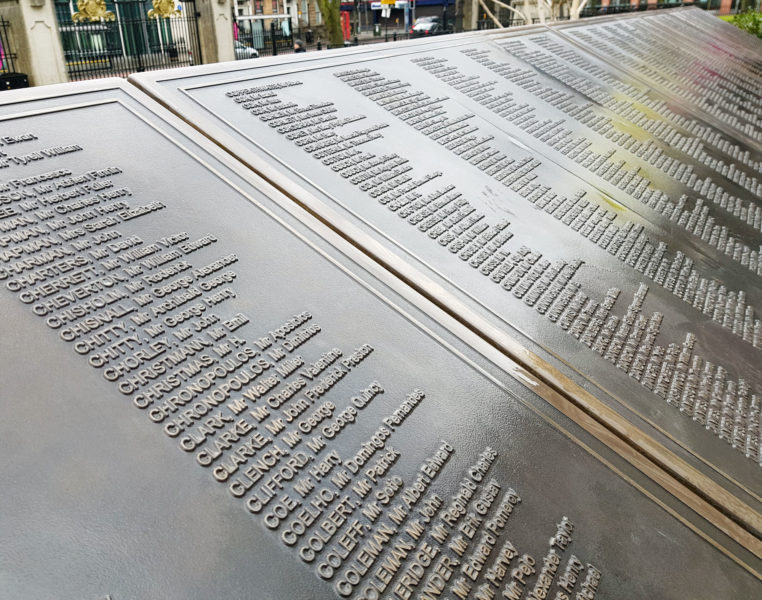
Titanic Quarter
On the other side of the River Lagan lies the newly revamped Titanic Quarter. Once a rough and rusty area of industrialisation, a place where notable cruise lines were built, the recent and rapid development of this former shipyard has completely revitalised the area.
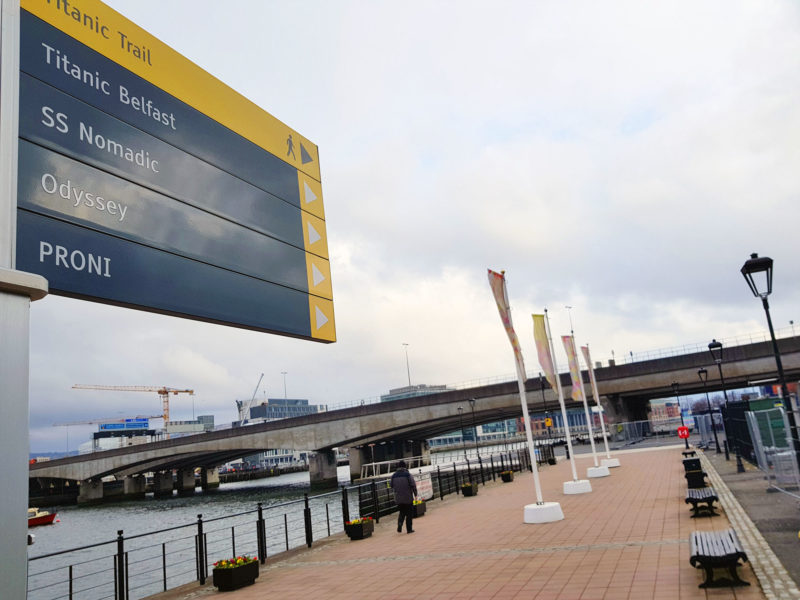
Here’s an insider tip for a short break to Belfast… It’s a great idea if you can do much of the Titanic Quarter at the same time. Depending on the weather, the 30 minute walk from the city centre which is only 1.5mi (2.4km) might feel like an age, although on a nice day it’ll be a leisurely stroll along the waterfront.
There’s enough to fill an entire day in the Titanic Quarter, as it’s now home to HMS Caroline, SS Nomadic, the film set for the TV hit Game of Thrones and the shiny and sleek, Titanic Belfast.
Titanic Belfast
Awarded the World’s Leading Tourist Attraction 2016, Titanic Belfast takes the crown as THE number one thing to do in Belfast, and rightly so. The multimedia experience covers the history of the industry in Belfast all the way through to the creation, destruction and aftermath of the words most famous ship.
Not a museum nor an exhibit. Titanic Belfast is an EXPERIENCE.
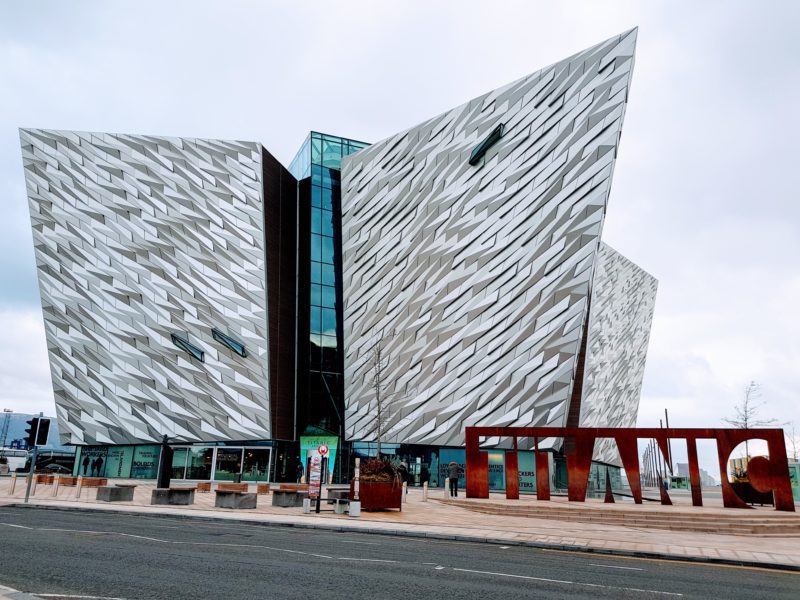
Allocate about half a day to visit Titanic Belfast, extending over nine interactive galleries and drawing together aspects from the construction of the liner to travelling to the accident and the depths of the ocean to discover the wreckage. Belfast is where Titanic began and it’s certainly not an attraction to skip. Take a moment outside to see the slipways where Titanic was built and launched.
We arrived early, ready for opening. By the time we left many hours later the queue for tickets was rather lengthy. So do yourself a favour, pre-book your tickets online or get there first thing to ensure you get the best chance to see the exhibits, read the information boards and no queue for the shipyard ride.
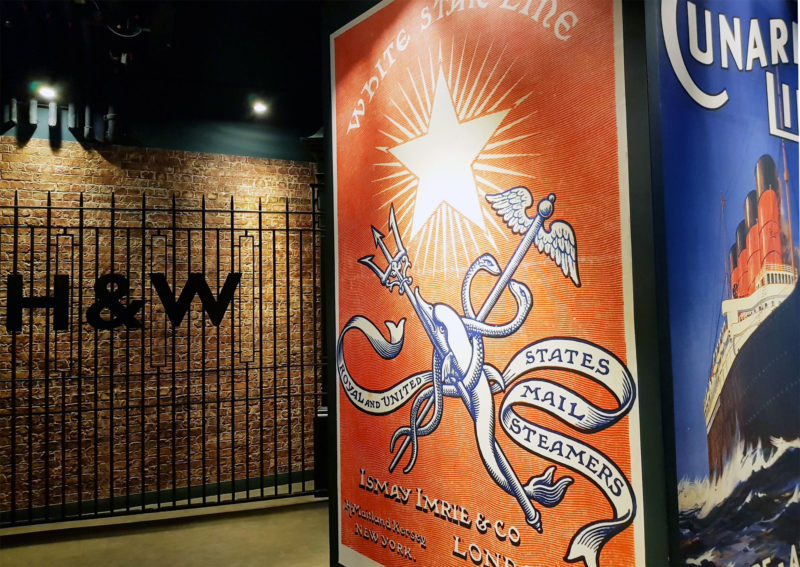
Audio guides are available at an additional charge, but I really enjoyed mine and think it’s worth the extra £3 and can be programmed into 7 languages other than English.
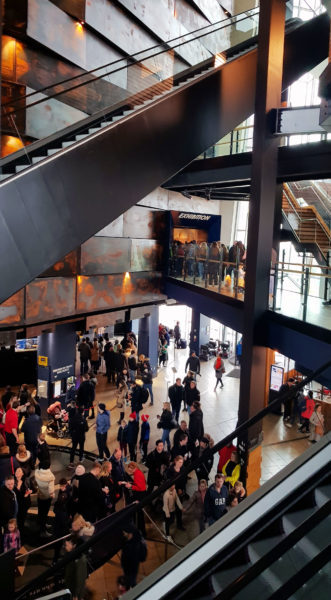
As a couple, we navigate museums at a different pace, so as we popped on our audio guides and bid each other farewell. Meandering through the entire museum at our own pace for a fully immersive experience. For me personally, I found Titanic Belfast is a roller coaster of emotions. The personal stories and the series of events on that fateful night left me reeling. I found myself wiping away the tears in some sections, grateful for the dark corners to gather myself and process the emotion and reaction I hadn’t anticipated.
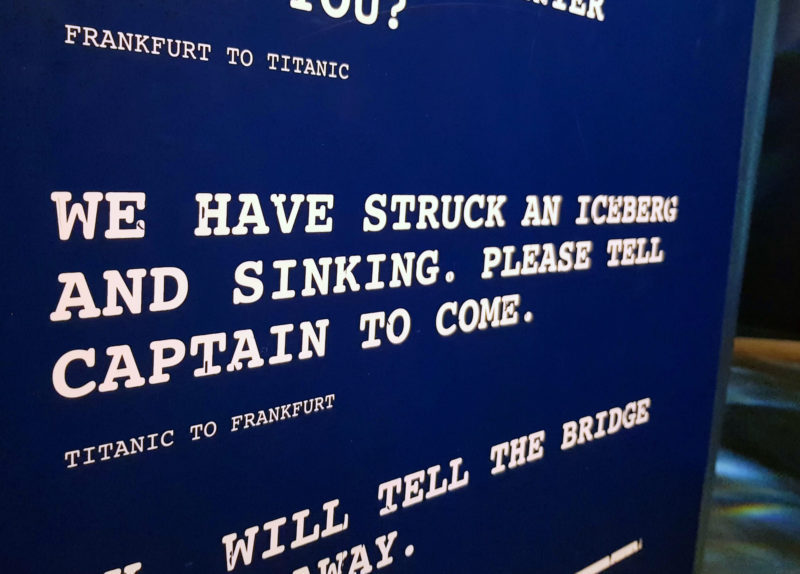
You can save a few pounds on the entry price by getting a late entry ticket (£10 adults/£8 children) which provides access for just one hour before closing. Noting it does not include the shipyard ride or SS Nomadic, and given we spent hours here, it’s not an ideal option unless you’re extremely limited on budget and/or time.
Reserve tickets for Titanic Belfast
SS Nomadic
The SS Nomadic is the last remaining White Star vessel. Entry here is included in your Titanic Belfast ticket. While it doesn’t have the grandeur or the legend of Titanic, it is worth maybe an hour of your time as you walk back to Belfast city centre.
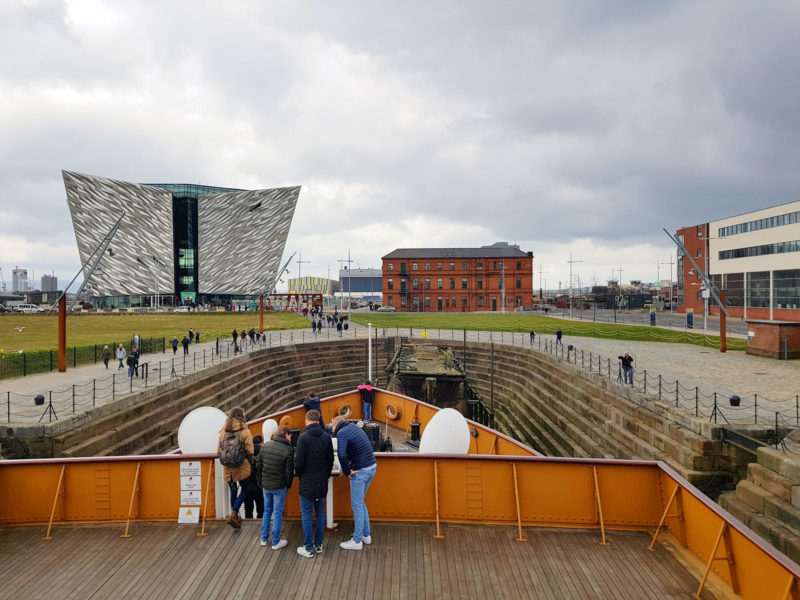
HMS Caroline
The only surviving warship from WWI, she is Belfast’s newest attraction. The makeover sees impressive recreated cabins that have been restored as if the crew left the ship yesterday, and an interactive self-guided tour of the ship.
I found navigating the ship quite disorientating and do wonder how navy personnel do it on a day to day basis. All the corridors and rooms begin to look the same after a while. In various rooms there are hands on activities for kids and adults alike and plenty of information via the audio guide.
Do go up to the deck and play captain with the steering wheel. A Captain’s hat isn’t provided but I don’t see why you can’t bring your own! 😉
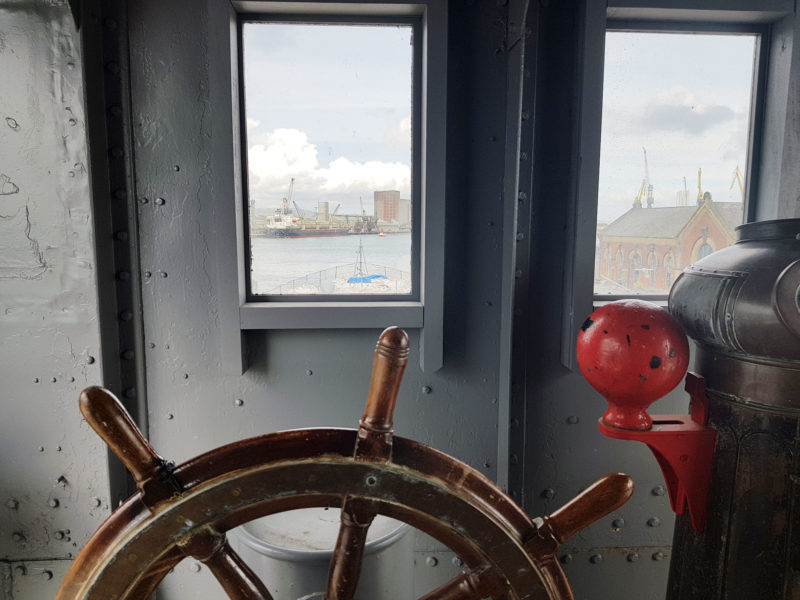
St George’s Market
Ireland’s oldest continually operated food market was high on my list to visit. With a list as long as my arm of vendors to see, speak to and of course, products to sample!
With numerous offerings, the market sells everything from home-wares, meat and flowers to local food, craft and live music on weekends. If you’re in town at Christmas, come here for the Christmas Market.
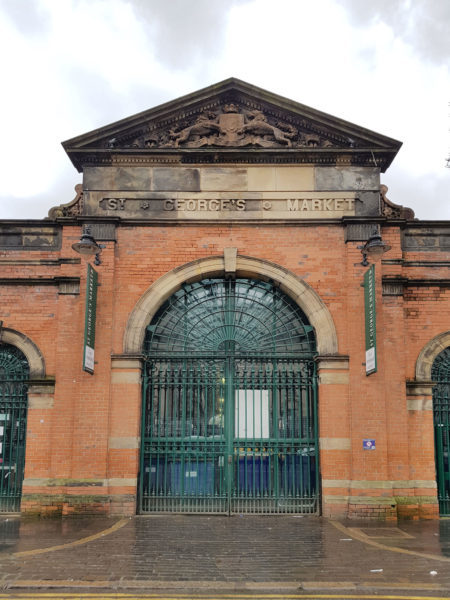
You can probably sense my enthusiasm for St George’s Market, so therefore you can probably sense the gut-wrenching disappointment from discovering that the day we had scheduled to visit, Easter Sunday, was the day the Market was closed. *cue tears*. This is the downside of visiting a religious country over Easter, things close unexpectedly. Without any more time in Belfast we couldn’t reschedule for another day, so St George’s will have to wait for me until we return again to Belfast.
Crumlin Road Gaol
Crumlin Road Gaol, locally referred to as The Crum, was home to many political prisoners in the height of The Troubles and was the scene of 17 executions between 1854 and 1961.
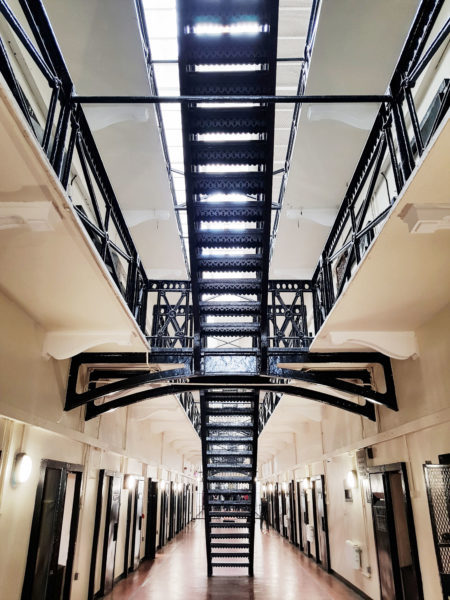
To explore The Crum, take a tour and explore this spooky establishment. Guided tours that last just over an hour, take visitors through the tunnel that runs under the road, leading prisoners through to the courthouse, the cramped cells of Wing C, and finish off at the execution chamber and the graveyard.
If you’re in town on the right day, The Crum doubles as an event and concert space. They also run other tours including evening historical, ghost walk and paranormal tours.
Drinking and Craic
It wouldn’t be Belfast without some good Craic.
Craic is the Irish word for fun. You can have a craic, or go out in search of it. Ultimately, it’s what you want to find when you’re in Belfast. One thing is guaranteed, if you follow the sound of traditional Irish music, like the Bodhrán drum, it’s going to be a packed house so find a spot where you can.
We visited Belfast over the Easter long weekend. Northern Ireland has some complicated licensing laws over Easter so if you’re planning a pub crawl, best to check locals or with your hotel to ensure you’re up with the latest restrictions.
We noted bans on selling booze after midnight on Easter Thursday and Sunday, and further restrictions 5pm and 11pm on Good Friday. We successfully skirted the controls and had no trouble getting a pint or two.
These were some of our favourite watering holes in Belfast:
- The Crown Liquor Saloon, also known as the Crown Bar is a National Trust property. This stunning Victorian era pub is hugely popular with locals and visitors alike. Get there early to nab a snug and admire the mosaics, the red granite topped bar, highly decorative carved ceilings and the pub’s etched and stained glass windows.
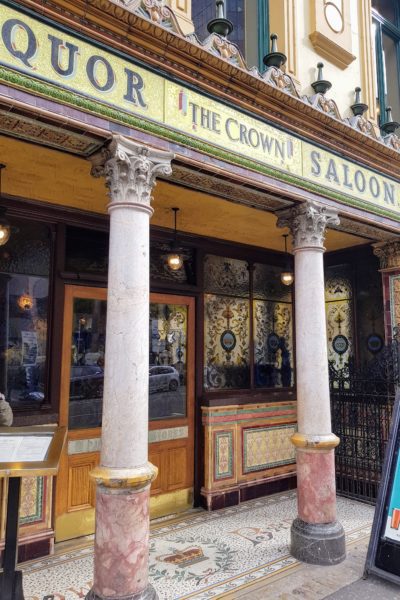
- McHugh’s Bar – centrally located near Albert Clock and offers plenty of live music sessions at least six nights a week! Entry is free.
- Craft beer and live music at the John Hewitt bar. While this might seem like a strange name for a pub, it comes from the late poet, socialist and Freeman of Belfast, who opened Belfast Unemployed Resource Centre. The opened the pub to make money for their centre. Cheers to that, I say!
- The Dirty Onion – A dog friendly establishment that’s perfect in nice weather with lots of seating and a laid back vibe.
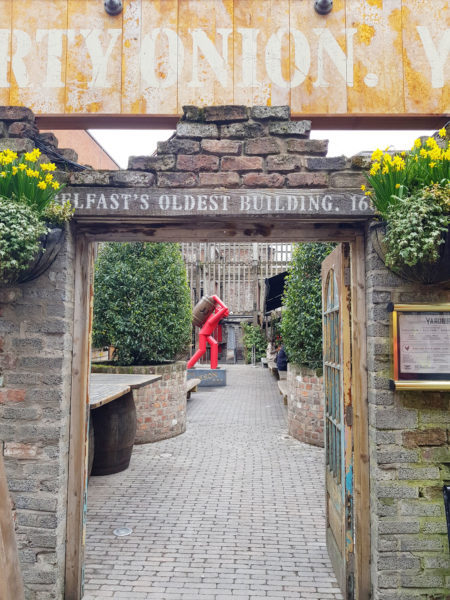
- The city isn’t exactly flush with rooftop bars, but two notable ones are Babel at the Bullitt hotel, and The Perch located in the historic Linen Quarter.
- Duke of York – Located on the gorgeous renovated Commercial Court, this traditional bar is crammed with mirrors & memorabilia as well as having a huge selection of Irish whiskeys. Come at dusk to see the lane-way and murals transform into a illuminated playground.
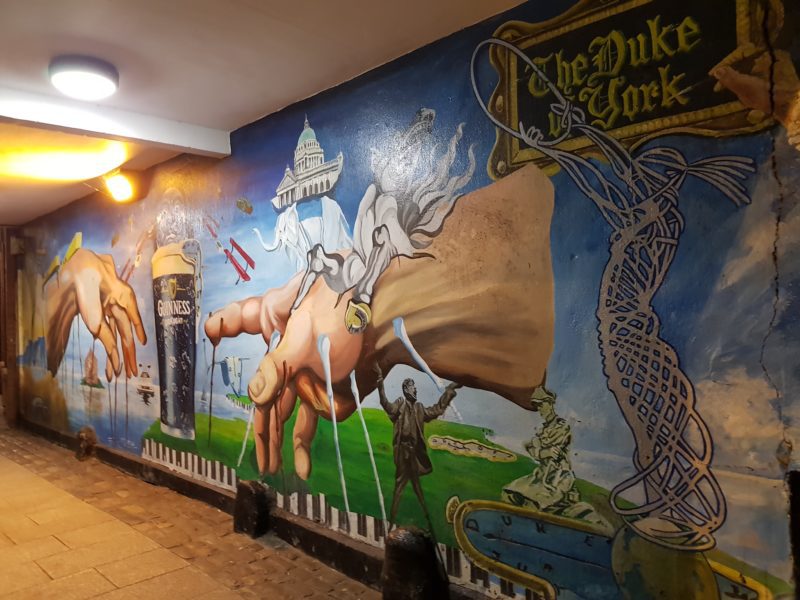
Where to Stay
Belfast has been identified as a hotspot for hotel development, so new openings are sprouting up providing more than 1,000 additional rooms in the city. So, you’ll soon be spoilt for choice.
If you’re a fan of all things Titanic, then the Titanic Hotel Belfast is surely the hotel for you. The 4-star hotel is situated opposite the new Titanic Belfast and the Titanic slipway, and built on the site of the former Harland & Wolff headquarters building and drawing offices.
Heritage spaces retained in the development including the Drawing Offices and some key heritage rooms within the hotel are open to public tours.
Belfast is home to Europa hotel, which at one stage held the unfortunate record as the “most bombed hotel in the world” after having suffered 36 bomb attacks during the Troubles. It’s fortunately dropped in those rankings, but it does still maintain the title of “most bombed hotel in Europe”.
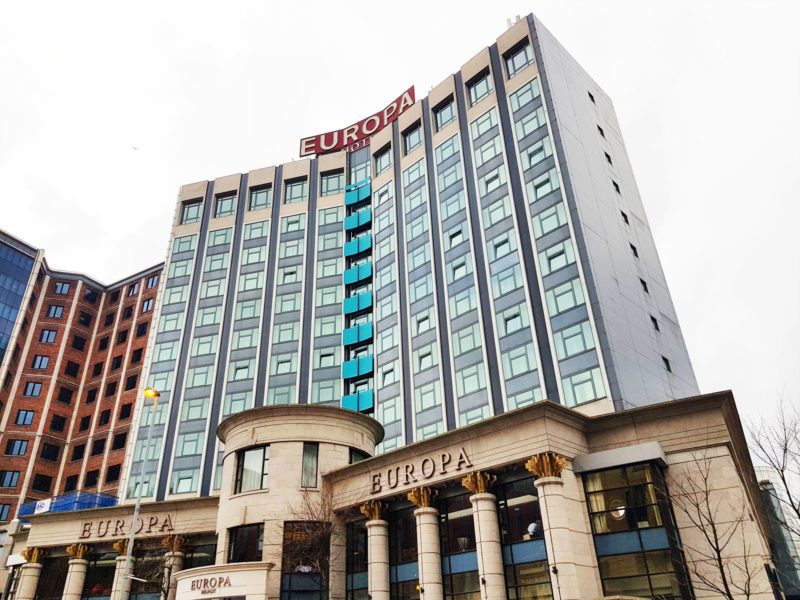
If you’re looking for something a new more modern and vibrant then perhaps a stay at The Bullitt is what you’re looking for. A cool space for people to ‘work, play and stay’ right in the heart of the city. It’s not just a hotel, it’s a lifestyle. Stay in the heart of Belfast’s Cathedral Quarter, just a stone’s throw from the city’s best eateries, perfectly located for a short city break. Oh and there’s a funky nightclub on the top floor! What’s it like to stay at The Bullitt? Here’s our review.

Getting Around
George Best Belfast City Airport is just three miles from the city centre and is well served from across the UK by airlines including Aer Lingus, British Airways, and Flybe.
We flew with Ryanair, into Belfast International Airport is 13 miles northwest of the city and which also serves EasyJet. A quick express bus into the city centre takes 40 minutes and costs £11 (adult, return). The easiest way to purchase tickets from the Visit Belfast desk in the arrivals terminal.
Belfast has a compact city centre so it’s easy to traverse on foot. Streets radiate outwards from City Hall so this walkable city is feasible for most.
Public transport in Belfast is via an integrated smart card system from Translink. If you’re only in Belfast for a short break, you probably only want to take a bus once or twice, just pay cash to the bus driver – try and have small change and remember it’s Pounds not Euros, it’s Northern Ireland after all.
Final Thoughts
We’ve had a visit to Northern Ireland’s capital city on our To Visit List for so long and after spending 4 days experiencing Belfast we cannot wait to return! We loved everything that Belfast had to offer, as you can tell from the above list, but there is one thing that amazed us….just how incredibly friendly and inviting people from Belfast were. World-class hospitality and we simply can’t wait to return.
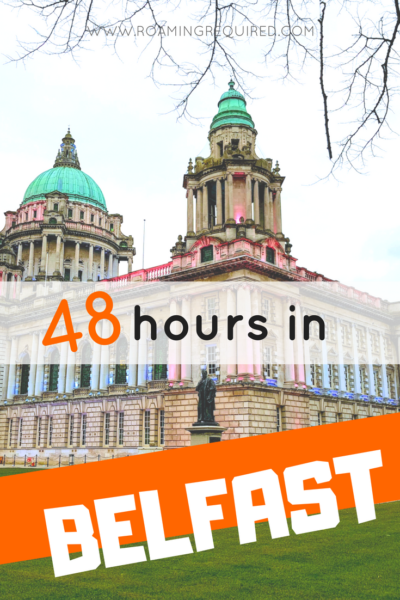
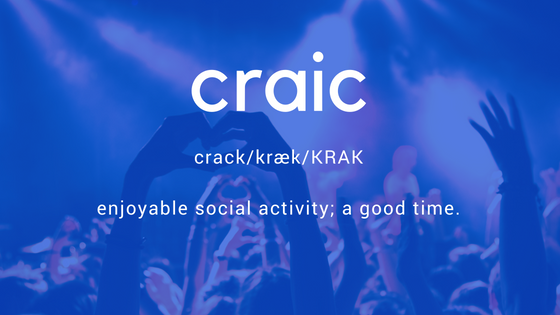
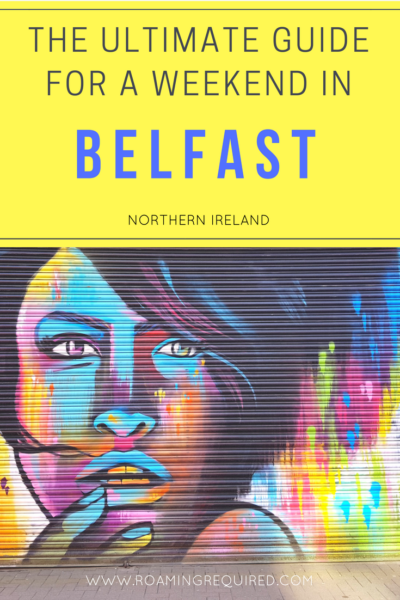
[…] A Weekend in Belfast, the Northern Ireland capital […]
[…] roamingrequired.com […]
My weekend will not be boring if I do all the activities that you shared with us when I visit Belfast. Thanks, you really help us a lot.
Wow, what a great write-up of a city I don\\’t know much about. Whenever we make it to Ireland (from Canada), it will definitely be on our list!
Thank you! There are so many carriers flying into Ireland now I am sure you can score yourself a deal soon enough.
Belfast is a seriously excellent city, despite the fact I can never understand their accents! Never made it to the maritime museums yet but now putting it on the list for a return 🙂